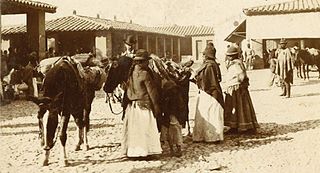
The Aymara or Aimara, people are an indigenous people in the Andes and Altiplano regions of South America; about 2.3 million live in northwest Argentina, Bolivia, Chile, and Peru. Their ancestors lived in the region for many centuries before becoming a subject people of the Inca in the late 15th or early 16th century, and later of the Spanish in the 16th century. With the Spanish-American wars of independence (1810–1825), the Aymaras became subjects of the new nations of Bolivia and Peru. After the War of the Pacific (1879–1883), Chile annexed territory with the Aymara population.
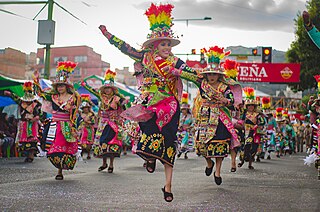
Tinku, a Bolivian Aymara tradition, began as a form of ritualistic combat. In the Quechua language, it means "meeting-encounter". During this ritual, men and women from different communities will meet and begin the festivities by dancing. The women will then form circles and begin chanting while the men proceed to fight each other; eventually the women will join in the fighting as well. Large tinkus are held in Potosí during the first few weeks of May.

Bartolina Sisa Vargas was an Aymaran woman and indigenous heroine who led numerous revolts against the Spanish rule in Charcas, then part of the Viceroyalty of Peru and present-day Bolivia. Alongside her husband, the indigenous leader Túpac Katari, she participated in the organisation of indigenous military camps that took part in the siege of La Paz. She was betrayed and turned in to the Spanish authorities, who later executed her.
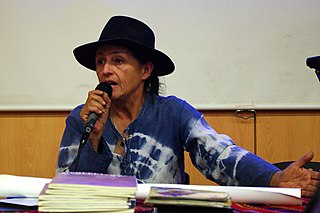
Silvia Rivera Cusicanqui is a Bolivian feminist, sociologist, historian, and subaltern theorist. She is Emeritus Professor at the Universidad Mayor de San Andrés in La Paz, Bolivia, where she taught Sociology for over thirty years. She draws upon anarchist theory as well as Quechua and Aymara cosmologies. She is a former director and longtime member of the Taller de Historia Oral Andina. The Taller de Historia Oral Andina has conducted an ongoing critique of Western epistemologies through writings and activism for nearly two decades. She is also an activist who works directly with indigenous movements in Bolivia, such as the Katarista movement and the coca growers movement.

Isiboro Sécure National Park and Indigenous Territory is a protected area and Native Community Land in Bolivia situated between the north of the Cochabamba Department and the south of the Beni Department. It protects part of the Bolivian Yungas ecoregion. The indigenous people living within the park belong to the Tsimané, Yuracaré, and Mojeño-Trinitario peoples. The southern portion of the park has been colonized by agricultural settlers, primarily coca farmers, since the 1970s. The Bolivian government estimates that 10% of the park has been deforested by their presence.

The Diablada, also known as the Danza de los Diablos, is an Andean folk dance performed in the Altiplano region of South America, characterized by performers wearing masks and costumes representing the devil and other characters from pre-Columbian theology and mythology. combined with Spanish and Christian elements added during the colonial era. Many scholars have concluded that the dance is descended from the Llama llama dance in honor of the Uru god Tiw, and the Aymaran ritual to the demon Anchanchu, both originating in pre-Columbian Bolivia

T'anta wawa is a type of sweet roll shaped and decorated in the form of a small child or infant. They are generally made of wheat and sometimes contain a sweet filling. They are made and eaten as part of ancestral rites in Andean regions of Bolivia, Ecuador, Peru, the south of Colombia, and the north of Argentina, mainly on All Souls' Day, but also as part of agricultural festivals, carnivals, and Christmas.
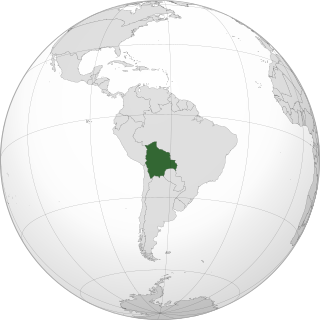
The history of the Jews in Bolivia goes back to the colonial period of Bolivia in the 16th century. In the 19th century, Jewish merchants came to Bolivia, most of them taking local women as wives and founding families that merged into the mainstream Catholic society. This was often the case in the eastern regions of Santa Cruz, Tarija, Beni and Pando, where these merchants came either from Brazil or Argentina.
Etelvina Villanueva y Saavedra (1897–1969) was a Bolivian educator, feminist organizer, writer, and poet.

Carlos Medinaceli (1899–1949) was a Bolivian writer and intellectual. His 1947 novel La chaskañawi deals with sexual entanglements between "cholas" and Criollo people.
Anarchism in Bolivia has a relatively short but rich history, spanning over a hundred years, primarily linked to syndicalism, the peasantry, and various social movements. Its heyday was during the 20th century's first decades, between 1910 and 1930, but a number of contemporary movements still exist.

Elsa Cladera de Bravo. (1922–2005) was a Bolivian trade union leader and educator, leader of the teachers organisation in Bolivia, delegate at the "Asamblea del Pueblo" in 1971, engaged in the work for women's emancipation

Teresa Gisbert Carbonell de Mesa was a Bolivian architect and art historian. She specialized in the history of the Andean region.
Justa Canaviri is an Aymara, Bolivian woman who has become noted for her dress in the traditional Chola dress and bowler hat, outspokenness on issues such as family violence, LGBT rights, and indigenous rights. Often called Bolivia's most recognizable chola, Canaviri changed the face of Bolivian television, when she began broadcasting her cooking show by introducing for the first time an indigenous woman as the main presence. In 2014, she was honored as one of the BBC's 100 Women Series.
Nicolasa Machaca Alejandro is a Bolivian union leader and health care worker.
Dámasa Cabezón was an Argentine-Chilean educator and women's education pioneer in 19th-century South America. A daughter of the Spanish educator José León Cabezón, she founded educational institutes for girls in Santiago de Chile (1838) and La Paz, Bolivia (1845). She has been credited with establishing the first generation of secular schools for girls in Chile.
The Anarchic Cell For Revolutionary Solidarity was an anarchist urban guerrilla group that was active in the city of La Paz, where it carried out several explosive attacks in the first half of 2012, causing material damage.

Martha Yujra Apaza is a Bolivian politician and trade unionist who served as minister of cultures and tourism from 2019 to 2020. A prominent trade union leader in El Alto, Yujra was the only indigenous member of the Jeanine Áñez Cabinet and was the final official to head the Ministry of Cultures and Tourism; the institution was abolished during her term. During her tenure, Yujra's office primarily dealt with the effects of the COVID-19 pandemic on the cultural sector, devising means of alleviating the economic ramifications of quarantine measures on artisans and entertainers. She subsequently served as a counselor at the Embassy of Bolivia in Quito from July to November 2020. Prior to serving as minister, Yujra gained notoriety for her fierce opposition to the government of Evo Morales. In 2017, she led a breakaway faction of the pro-government El Alto Regional Workers' Center. As its executive secretary, Yujra aligned the union with the Bolivia Says No alliance, running unsuccessfully to represent La Paz in the Chamber of Deputies in the annulled 2019 general elections.
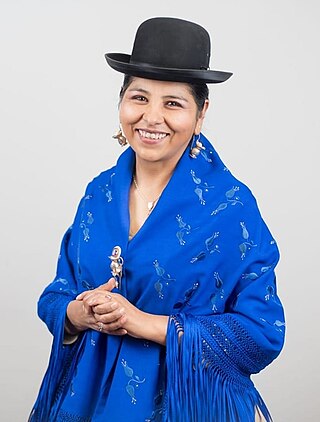
Bertha Beatriz Acarapi is a Bolivian politician and former television presenter serving as a party-list member of the Chamber of Deputies from La Paz since 2020. A member of the Movement for Socialism, she previously served as an El Alto municipal councillor from 2000 to 2004 on behalf of the Revolutionary Left Movement and from 2004 to 2010 on behalf of Plan Progress for Bolivia. During her second term, she served as president of the El Alto Municipal Council from 2006 to 2007, becoming the first woman to assume that post. Outside of politics, Acarapi's lengthy career in radio and television journalism led her to join ATB in 2015, becoming one of the country's first high-profile chola indigenous presenters.
Antonio Diaz Villamil (1897–1948) was a Bolivian writer. He graduated from the Instituto Nacional Superior, and became a teacher. He rose to become director of the Colegio Bolivar, La Paz. A prolific writer, he wrote fiction and drama, and also textbooks. His most important work is the costumbrista novel La nina de sus ojos (1948), widely regarded as one of the best novels in Bolivian literature.














